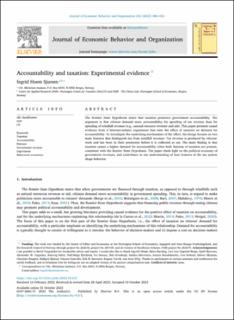Accountability and taxation: Experimental evidence
Journal article, Peer reviewed
Permanent lenke
https://hdl.handle.net/11250/3116671Utgivelsesdato
2023-01-01Metadata
Vis full innførselSamlinger
- Publications [1488]
Originalversjon
in Journal of Economic Behavior and Organization vol. 216 pp. 386-432Sammendrag
The Rentier State Hypothesis states that taxation promotes government accountability. The argument is that citizens demand more accountability for spending of tax revenue than for spending of windfall revenue (e.g., natural resource revenue and aid). This paper presents causal evidence from a between-subject experiment that tests the effect of taxation on demand for accountability. To investigate the underlying mechanisms of the effect, the design focuses on two main features that distinguish tax from windfall revenue: Tax revenue is produced by citizens’ work and has been in their possession before it is collected as tax. The main finding is that taxation causes a higher demand for accountability when both features of taxation are present, consistent with the Rentier State Hypothesis. The paper sheds light on the political economy of government revenues, and contributes to our understanding of how features of the tax system shape behavior.
